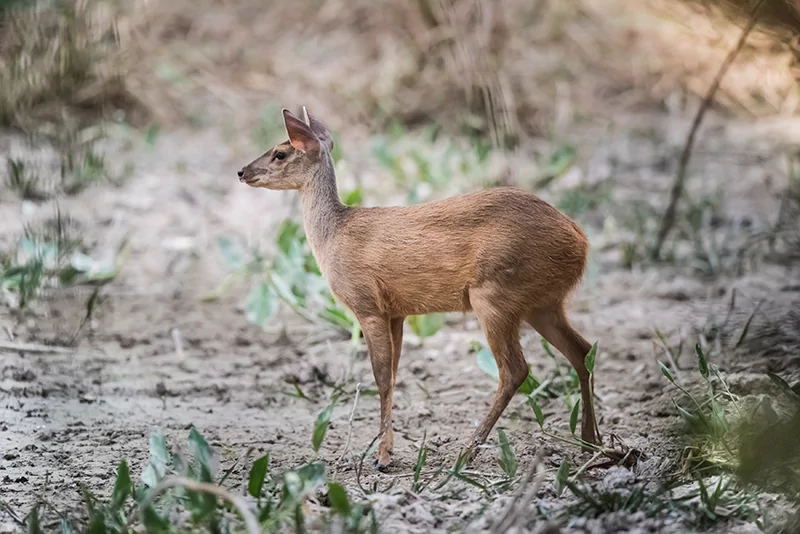Marsupials in India: First Sightings, Fossil Evidence & Evolution
Introduction
Are Marsupials Found in India?
- As of 2024, no native marsupial species have been discovered in India.
- However, recent sightings of marsupial species in the wild have been reported, raising speculation about their origin.
- Marsupials are primarily found in Australia, New Guinea, and the Americas, and their presence in India is considered an anomaly.
Recent First Sightings of Marsupials in India (2023–2024)
- In June 2022, kangaroos were spotted in West Bengal, likely released illegally by animal smugglers.
- In 2023 and early 2024, additional marsupial sightings were reported in Assam and Bihar, believed to be escaped exotic pets.
- Some wallabies (small kangaroo species) were also spotted near Indian forests, raising concerns about illegal wildlife trade.
Scientific Explanation for Sightings
- These sightings do not indicate a native marsupial population but suggest an increase in illegal trade of exotic species.
- No marsupial species have naturally evolved in India since India separated from Gondwana (~100 million years ago).
Related Reports:Illegal Wildlife Trade & Kangaroos in India
What Are Marsupials?
Definition & Key Characteristics
- Marsupials are a group of mammals distinguished by their pouch-based reproduction.
- Unlike placental mammals, marsupials give birth to underdeveloped young, which then mature in the mother’s pouch.
Examples of Marsupials
- Australia: Kangaroo, Koala, Wombat, Tasmanian Devil.
- South America: Opossum, Monito del Monte.
- North America: Virginia Opossum (Only marsupial found in the USA).
- India & Asia:No known native marsupial species.

Why Are Marsupials Not Found in India?
- India was once part of the supercontinent Gondwana, where early marsupials evolved.
- When India drifted away from Gondwana (~100 million years ago), marsupial populations were cut off.
- Later, placental mammals dominated the Indian ecosystem, leading to the extinction of marsupial-like mammals in India.
First Sightings of Marsupials in India: Recent Reports (2022–2024)
June 2022 – West Bengal Incident
- Three kangaroos were spotted and rescued in Jalpaiguri, West Bengal.
- These were likely smuggled from Australia via illegal wildlife trade.
April 2023 – Assam & Bihar Sightings
- Forest officials reported small marsupials (possibly wallabies) in rural areas.
- DNA tests confirmed they were not native species but likely escaped from illegal captivity.
December 2023 – Exotic Pet Trade Concerns
- Authorities found smuggled kangaroo joeys in an illegal pet trade operation.
- This raised alarms about rising illegal exotic animal trade in India.
Marsupial Fossil Evidence in India
Has India Ever Had Native Marsupials?
- No modern marsupial species exist in India today.
- However, fossil evidence suggests that marsupial ancestors may have once roamed ancient India.
Fossil Discoveries Related to Marsupials in Asia
- Sinodelphys szalayai (125 million years old) – Oldest known marsupial ancestor, found in China.
- Deltatheroida fossils – Marsupial-like mammals from Mongolia (~85 million years ago).
- No direct marsupial fossils found in India, but similar species likely existed during the Gondwana period.
Why Are There No Fossils in India?
- Lack of fossil preservation in humid tropical conditions.
- Incomplete fossil records due to geological changes.
- Rapid evolution of placental mammals, leading to marsupial extinction.
Why Did Marsupials Disappear from India?
- Continental Drift & Isolation
- 150 million years ago: Marsupial ancestors lived across Gondwana.
- 100 million years ago: India separated from Gondwana, leading to geographic isolation.
- 50 million years ago: India collided with Asia, allowing placental mammals to dominate.
- Competition with Placental Mammals
- Placental mammals reproduce faster & develop inside the womb, giving them a survival advantage.
- This led to the extinction of marsupial-like mammals in India.
- Climate & Habitat Changes
- India’s forests & grasslands changed over time, reducing suitable marsupial habitats.
- Extinction events (like asteroid impacts & climate shifts) may have wiped out marsupial ancestors.
Conservation & Policy Measures
Concerns About Exotic Pet Trade
- Illegal pet trade in India is growing, with more exotic species being smuggled.
- Many species, like kangaroos, cannot survive in India’s climate.
Government Measures Taken
- Strengthened Wildlife Protection Act to curb illegal pet trade.
- Increased monitoring at airports & borders.
- Public awareness campaigns against exotic pet ownership.
- No native marsupial species exist in India, but recent sightings suggest increasing illegal wildlife trade.
- Fossil evidence suggests marsupial-like ancestors once existed in India, but they became extinct due to continental drift and competition with placental mammals.
- Strict regulations are needed to prevent illegal import of exotic species to protect India’s native biodiversity.
Final Thought:
"India’s lost marsupials tell the story of evolution, while modern sightings warn us about the dangers of illegal wildlife trade."

















